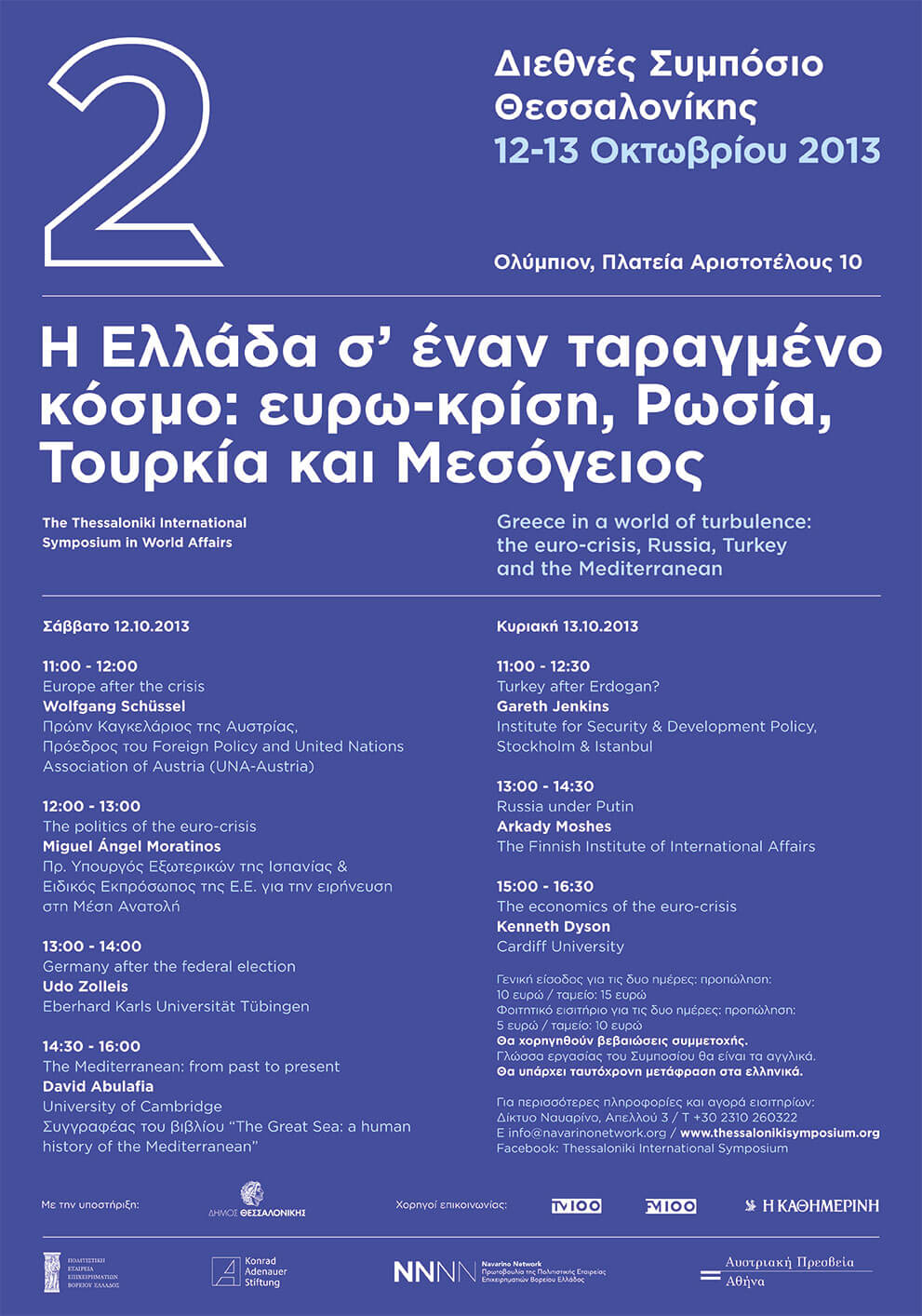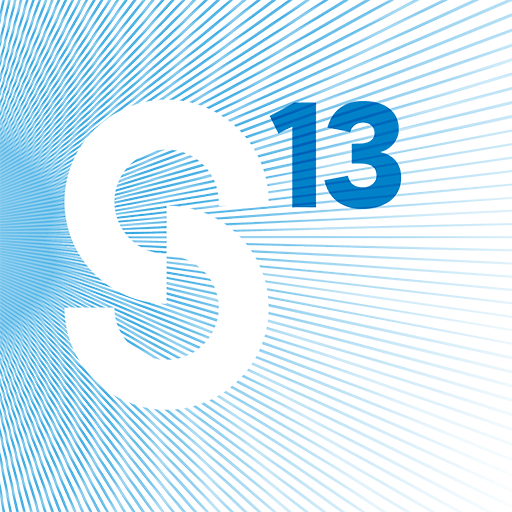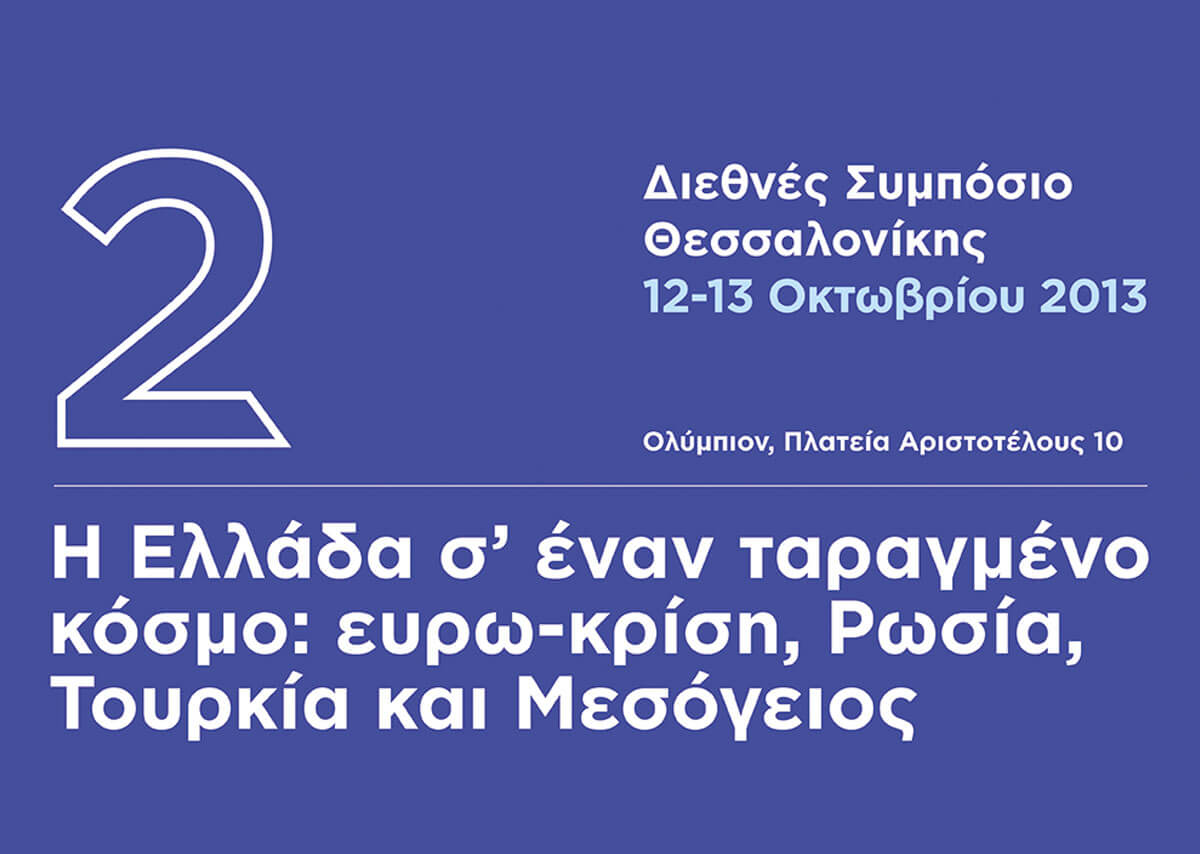Agenda
2th Thessaloniki International Symposium in World Affairs
Thessaloniki, October 12, 2013
The Northern Greece Entrepreneurs Cultural Society and the Navarino Network, with the support of the Konrad Adenauer Foundation, are organizing the 2nd Thessaloniki International Symposium in World Affairs, on October 12 and 13, 2013, at Olympion theater.
The aim of the Symposium, organized for the first time last year, on the occasion of the festivities commemorating Thessaloniki’s centennial since its liberation, is to establish a prestigious annual meeting that focuses on the political and economic developments in the wider region of Thessaloniki. These developments cause dramatic changes today as Greece’s neighborhood is in great turmoil. The participation of esteemed political and academic personalities from around Europe provides for a valuable opportunity to gain an in-depth knowledge and reflect on these issues while enhancing the openness of the city and its participation in the international debate on the most important global challenges of today.
Having been comprised of three themes last year (the decline of the West, the rise of China and Islam after the Arab Spring), this year’s topic is “Greece in a world of turbulence: the euro-crisis, Russia, Turkey and the Mediterranean” that examines the country’s position in a complex and volatile international political and economic environment.
The 2nd Thessaloniki International Symposium in World Affairs aims to provide a platform for dialogue on critical global political and economic challenges while promoting Thessaloniki’s engagement with developments internationally.
1. Saturday 12/10/2013, 11:00-12:00 – ” Europe after the Crisis “
Speaker’s short bio
Dr. Wolfgang Schussel was born in Vienna in 1945. In 1968 he received his Ph.D. from the Law School of the University of Vienna. His political career to the highest offices of the country began in 1975, when it was first elected as Member of the Austrian Parliament. From 1989 to 1995 he worked as Minister for Economic Affairs. In 1995 he was elected as head of the Austrian People’s Party. From 1995 to 1999 he was Vice Chancellor and Federal Minister for Foreign Affairs. Between 2000 and 2007 Dr. W. Schussel served as Federal Chancellor of Austria where, amongst other things, he strove for the integration of Austria into the European Union. Since 2008 Dr. W. Schussel has been President of the Foreign Policy and United Nations Association of Austria.
2. Saturday 12/10/2013, 12:00-13:00 – The Politics of the Euro-Crisis “
Speaker’s short bio
Miguel Angel Moratinos was born in Madrid in 1951. Enterprising diplomat and politician, he was an active member of the Socialist Workers’ Party of Spain (Partido Socialista Obrero Espanol) and member of Congress, where he represents Cordoba. He served as Minister of Foreign Affairs in the Government of Jose Luis Rodriguez Zapatero from April 2004 until October 2010. Between 1996 and 2003, M. A. Moratinos was the European Union Special Representative for the Middle East Peace Process. In 2007, was the Chairman-in-Office of the Organization for Security and Co-operation in Europe.
3. Saturday 12/10/2013, 13:00-14:00 – ” Germany after the federal election “
Speaker’s short bio
Udo Zolleis was born in Munich in 1951. Since 2010 is a honorar professor for Political Science of the Eberhard Karls University Tubingen. He specializes in the field of elections and political parties, in comparative study of political systems, in political governance and political coordination and finally in political communication and marketing. In the past he was a researcher at the Centre for European and North-American Studies (ZENS) at Georg-August University in Gottingen and the Political Institute of Political Sciences of the Eberhard Karls University in Tubingen. The topic of his thesis is: “The Christian Conservative Party (CDU). The change of the Christian-democratic model”.
4. Saturday 12/10/2013, 14:30-16:00 – ” The Mediterranean: From Past to Present “
Speaker’s short bio
David Abulafia was born in 1949. Is one of the most recognized and influential British historian specializing in economic, social and political history of Italy, Spain and Sicily during the Middle Ages and throughout the Renaissance. Since 2000 he has been Professor of Mediterranean History at the University of Cambridge and a Fellow of Gonville and Caius College, Cambridge since 1974. He was Chairman of the Faculty of History at Cambridge University and in 2008 he was elected a member of the governing Council of Cambridge University. He is also a Fellow of the British Academy and a Member of the Academia Europaea. His book entitled “The Great Sea” (2011) became commercially successful in U.K. directly the publication and compel admiration from academics around the world.
1. Sunday 13/10/2013, 11:00-12:30 – ” Turkey after Erdogan? “
Speaker’s short bio
Gareth Jenkins is an author, analyst and a Senior Associate Fellow with the Joint Center’s Silk Road Studies Program and Turkey Initiative, based in Istanbul. He worked as a journalist for international newspapers and periodicals, covering a broad range of political, economic and social issues related to Turkey and the surrounding region. In recent years he has focused mainly on analysis, contributing numerous articles, reviews and commentaries to scholarly journals and edited volumes. His research interests focus on civil-military relations, the Kurdish issue, terrorism, security issues and political Islam.
2. Sunday 13/10/2013, 13:00-14:30 – ” Russia under Putin “
Speaker’s short bio
Dr Arkady Moshes is a senior researcher with the Finnish Insitute of Interational Affairs (FIIA), heading its Russia and European Union (EU) Program. Before joining FIIA, he held various positions at the Institute of Europe of the Russian Academy of Sciences, as Head of Section of Security of Central Eastern Europe and the Baltic Sea, Head of Section for European Security and Arms Control and researcher at in the Section for Military Political Studies and European Policy Department. Dr. Moshes has researched and written extensively on Russia’s policy toward the Western Commonwealth of Independent States and Baltic States, EU-Russian relations, and Internal and Foreign Policy of Belarus and Ukraine.
3. Sunday 13/10/2013, 15:00-16:30 – ” The Economics of the Euro-Crisis “
Speaker’s short bio
Kenneth Dyson has been Research Professor in the School of European Studies at Cardiff University, Wales since 2003. He was appointed Professor of European Studies at the University of Bradford, he has been Visiting Professor at Konstanz University, Germany, and DAAD Distinguished Visiting Professor at the Free University of Berlin. He is – amongst others- Fellow of the British Academy and a founder and chair of the Standing Conference of Heads of European Studies. Kenneth Dyson is the author of numerous books on scientific subjects of European integration, especially economic policies, in EU studies and in German political studies. In 2010 published his two-volume work on European Economic Governance “European Economic Governance and Policies: Commentary on Key Documents” and edited the collective work “Which Europe? The Politics of Differentiated Integration”.
Multimedia


